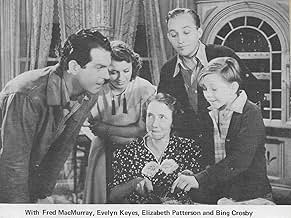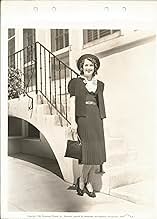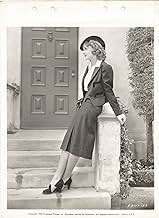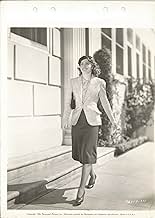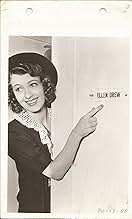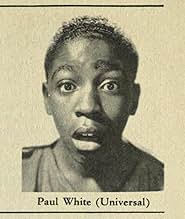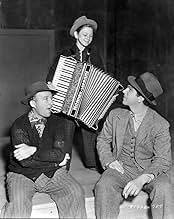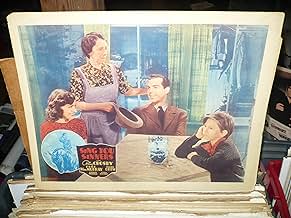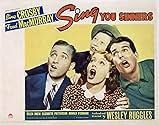Three singing brothers have different goals: Mike wants childhood fun, Dave seeks work and marriage, Joe chases risky schemes. Their shared singing act and Joe's secret gamble on a racehorse... Read allThree singing brothers have different goals: Mike wants childhood fun, Dave seeks work and marriage, Joe chases risky schemes. Their shared singing act and Joe's secret gamble on a racehorse lead to family tension.Three singing brothers have different goals: Mike wants childhood fun, Dave seeks work and marriage, Joe chases risky schemes. Their shared singing act and Joe's secret gamble on a racehorse lead to family tension.
- Awards
- 2 wins total
James Adamson
- Red Cap
- (uncredited)
Harry Barris
- Moose - Orchestra Leader
- (uncredited)
Harlan Briggs
- Customer at Gas Station
- (uncredited)
Marie Burton
- Minor Role
- (uncredited)
Ethel Clayton
- Minor Role
- (uncredited)
Chester Clute
- Race Tout at Lunch Counter
- (uncredited)
Heinie Conklin
- Lunch Counter Proprietor
- (uncredited)
Featured reviews
This is one of Bing Crosby's best films from the 1930s. It gave him a great opportunity to show off some dramatic ability and a couple of big selling hits one of which served as the title of the current biography by Gary Giddins.
Bing Crosby, Fred MacMurray and Donald O'Connor are the three Beebe brothers. And Bing is the source of much concern with mother Elizabeth Patterson. He's a lazy, shiftless, irresponsible and charming man who won't just settle down. The burden of supporting the family is left to brother Fred MacMurray who keeps postponing marriage to his long time sweetheart, Ellen Drew, until the family is all provided for. And finally kid brother Donald O'Connor idolizes Bing and wants to grow up just like him to the despair of Patterson and MacMurray.
Bing up and leaves the family, promising to go to Los Angeles, get into a steady business and settle down. Of course his idea of a steady business is to own a racehorse named Uncle Gus. He sends for Patterson and O'Connor and later MacMurray and Drew come and are all shocked.
The rest of the film is the usual run of movie plots where racehorses are concerned.
The Beebe brothers also have a singing act which MacMurray hates, but which brings in needed cash when the bills start piling up. That's where the musical score written by Jimmy Monaco and Johnny Burke comes in. Done as a trio number in the film, I've Got a Pocketful of Dreams became one of Crosby's biggest hits from the 1930s. Crosby's one solo number is Don't Let That Moon Get Away and in another trio number MacMurray is the lead singer in Laugh and Call It Love. Before he came to Hollywood, Fred MacMurray sang and played saxophone in various bands and also was in the original Broadway cast of Roberta. He had a pleasant, but thin tenor voice, but I don't think he'd have lasted in Hollywood if he had done musicals.
This was Donald O'Connor's first big break and he shows a hint of the dancing talent he had during the Pocketful of Dreams number. He and Crosby later re-united in the second version of Anything Goes in 1956.
One song was added into the score. Composed by Hoagy Carmichael and Frank Loesser, Small Fry was done as a novelty number by the trio. However Bing recorded it with his good friend Johnny Mercer and that novelty song also became a monster hit.
Sing You Sinners should be seen back to back with the James Cagney/Pat O'Brien film The Irish in Us as they have very similar plot development and characters.
This was the first of two Crosby films with a racetrack background, the other being Riding High. Curiously enough they had opposite plot conclusions. No spoilers here though, see both films and see what I mean.
Bing Crosby, Fred MacMurray and Donald O'Connor are the three Beebe brothers. And Bing is the source of much concern with mother Elizabeth Patterson. He's a lazy, shiftless, irresponsible and charming man who won't just settle down. The burden of supporting the family is left to brother Fred MacMurray who keeps postponing marriage to his long time sweetheart, Ellen Drew, until the family is all provided for. And finally kid brother Donald O'Connor idolizes Bing and wants to grow up just like him to the despair of Patterson and MacMurray.
Bing up and leaves the family, promising to go to Los Angeles, get into a steady business and settle down. Of course his idea of a steady business is to own a racehorse named Uncle Gus. He sends for Patterson and O'Connor and later MacMurray and Drew come and are all shocked.
The rest of the film is the usual run of movie plots where racehorses are concerned.
The Beebe brothers also have a singing act which MacMurray hates, but which brings in needed cash when the bills start piling up. That's where the musical score written by Jimmy Monaco and Johnny Burke comes in. Done as a trio number in the film, I've Got a Pocketful of Dreams became one of Crosby's biggest hits from the 1930s. Crosby's one solo number is Don't Let That Moon Get Away and in another trio number MacMurray is the lead singer in Laugh and Call It Love. Before he came to Hollywood, Fred MacMurray sang and played saxophone in various bands and also was in the original Broadway cast of Roberta. He had a pleasant, but thin tenor voice, but I don't think he'd have lasted in Hollywood if he had done musicals.
This was Donald O'Connor's first big break and he shows a hint of the dancing talent he had during the Pocketful of Dreams number. He and Crosby later re-united in the second version of Anything Goes in 1956.
One song was added into the score. Composed by Hoagy Carmichael and Frank Loesser, Small Fry was done as a novelty number by the trio. However Bing recorded it with his good friend Johnny Mercer and that novelty song also became a monster hit.
Sing You Sinners should be seen back to back with the James Cagney/Pat O'Brien film The Irish in Us as they have very similar plot development and characters.
This was the first of two Crosby films with a racetrack background, the other being Riding High. Curiously enough they had opposite plot conclusions. No spoilers here though, see both films and see what I mean.
Mother Beebe (Elizabeth Patterson) has three performing sons. Joe Beebe (Bing Crosby) is the reckless dreamer. David (Fred MacMurray) is the responsible one with long-suffering girlfriend Martha (Ellen Drew). Mike (Donald O'Connor) is the youngest one.
This is an interesting role for Bing Crosby. It is a change of speed for him and I like it. I thought that they may do a love triangle with the brothers. I like the story development with David and Martha. This is a musical, but it's not overloaded with songs. I do have a problem with a story element at the end. I can see why they did it, but I don't think it's realistic. I like this for the most part.
This is an interesting role for Bing Crosby. It is a change of speed for him and I like it. I thought that they may do a love triangle with the brothers. I like the story development with David and Martha. This is a musical, but it's not overloaded with songs. I do have a problem with a story element at the end. I can see why they did it, but I don't think it's realistic. I like this for the most part.
This film featured Crosby, Fred MacMurray and a 13-year old Donald O'Connor (!) as a trio of brothers who sing, dance and play instruments to bring money into their household. Their mother, played by Elizabeth "Miss Trumbull" Patterson, is widowed and has spent all the money her husband left her on paying for music lessons for her sons. MacMurray also works as a mechanic at a garage, a job he prefers over singing. Crosby plays one of those ne'er-do-well types who is always at the track trying to win money or some other money making scheme in lieu of actually holding down a 9-5 job. Mother Patterson desperately wishes Crosby would follow the lead of the responsible MacMurray. O'Connor plays their kid brother who just wants to be a kid and doesn't want the pressure of having to perform in order to earn money to support the family. All three of the brothers express disdain for having to be singers, stating that "they want to be men", whatever that meant in 1938.
It was crazy seeing Donald O'Connor as a child in this film. He got to do a little bit of hoofing, mostly while holding an accordion. MacMurray "plays" the clarinet (not sure if he was actually playing or not, I know MacMurray played saxophone) and Crosby sings. MacMurray also sang at one point, but his voice was not as good (obviously) as Crosby's.
One thing I think is strange in studio era films is the trend of having the lead actor/actress playing an oldest sibling who is at least 20 years older than all the other siblings. In this film, Crosby's character has to at least be in his 30s and I'm guessing MacMurray's character was probably supposed to be a little bit younger, but probably late 20s - early 30s. Then there's O'Connor who is only 13 and looks it. Why the huge age difference? Patterson looks like she could be the brothers' grandmother! I also thought it was odd that the racetrack would allow a 13-year old to be a jockey.
It was crazy seeing Donald O'Connor as a child in this film. He got to do a little bit of hoofing, mostly while holding an accordion. MacMurray "plays" the clarinet (not sure if he was actually playing or not, I know MacMurray played saxophone) and Crosby sings. MacMurray also sang at one point, but his voice was not as good (obviously) as Crosby's.
One thing I think is strange in studio era films is the trend of having the lead actor/actress playing an oldest sibling who is at least 20 years older than all the other siblings. In this film, Crosby's character has to at least be in his 30s and I'm guessing MacMurray's character was probably supposed to be a little bit younger, but probably late 20s - early 30s. Then there's O'Connor who is only 13 and looks it. Why the huge age difference? Patterson looks like she could be the brothers' grandmother! I also thought it was odd that the racetrack would allow a 13-year old to be a jockey.
This Wesley Ruggles souffle, in which Bing Crosby, Fred MacMurray and Donald O'Conner are singing brothers who... well, it doesn't much matter, does it? Every character and situation is written right in the middle of the performer's comfort zone (not that Fred MacMurray ever felt much stretched; he claimed that Billy Wilder was the only director who ever called on him to act).
I had a good time and can't remember much of anything. It's just the sort of movie with production values meant to anchor a film program you go to because of Bing Crosby and the next day you tell the guys about the Popular Science short or maybe the latest Popeye. With Ellen Drew as MacMurray's fiancee and Elizabeth Patterson as everyone's mother.
I had a good time and can't remember much of anything. It's just the sort of movie with production values meant to anchor a film program you go to because of Bing Crosby and the next day you tell the guys about the Popular Science short or maybe the latest Popeye. With Ellen Drew as MacMurray's fiancee and Elizabeth Patterson as everyone's mother.
I thought I was the luckiest kid alive. I sat in complete attendence of what was the best movie I can remember. It was very exciting to me and I think of it whenever I am depressed, because of It's upbeat outlook on life. I can stoll remember the words to the song "pocket Full Of Dreams" I've heard it played a few times,- once at the race track. I wish I could see it once more, or own a tape copy of it.
Did you know
- TriviaThe role of Mike Beebe, played by Donald O'Connor, was originally meant for Mickey Rooney. But Rooney was scheduled to make another picture at the same time.
- ConnectionsReferenced in The John Garfield Story (2003)
Details
- Release date
- Country of origin
- Language
- Also known as
- The Unholy Beebes
- Filming locations
- Santa Anita Park & Racetrack - 285 West Huntington Drive, Arcadia, California, USA(the first track Joe goes to, places bets, and swaps tickets)
- Production company
- See more company credits at IMDbPro
- Runtime
- 1h 30m(90 min)
- Color
- Aspect ratio
- 1.37 : 1
Contribute to this page
Suggest an edit or add missing content

